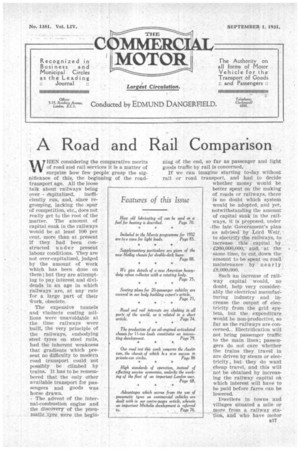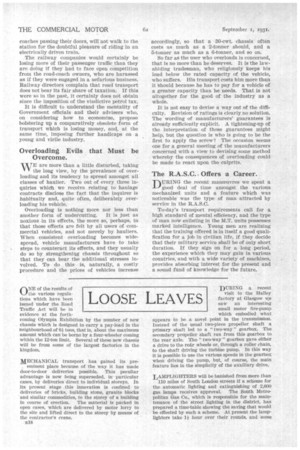A Road and Rail Comparison
Page 35

Page 36

If you've noticed an error in this article please click here to report it so we can fix it.
WHEN considering the comparative merits . of road and rail services it is a matter of surprise how few people grasp the significance of this, the beginning of the roadtransport age. All the loose talk about railways being over Capitalized, ineffi ciently run, and, since regrouping, lacking the spur • of competitiOn, etc., does not really get to the root of the matter. The amount of capital sunk in the railways would be at least 100 per cent. more than at present If they had been constructed under present labour conditions. They are not over-capitalized, judged by the amount of work which has been done on them ; but they are attempting to pay interest and dividends in an age in which • railways are, at any rate for a large part of their *ork, obsolete.. • The expensive tunnels and viaducts costing millions were unavoidable at the time railways were built, the very principle of the railways, embodying steel tyres on steel rails, had the inherent weakness that gradients which present no difficulty to modern road transport could not possibly be climbed by trains. It has to be remembered that the only other available transport for passengers and goods was horse drawn.
The advent of the: internal-combustion engine and the discovery of the pneumatie..1Yre were the, begin Mug of the end, so far as passenger and light goods traffic by rail is concerned.
If we can imagine starting to-day without rail or toad transport, and had to decide whether money would be better spent on the n3aking of roads or railways, there is no doubt which systeni would be adopted, and yet; notwithstanding the amount of capital Sunk in the railways, It: Is proPnsed, under .the late-GOvernment's plan . as advised by -I.41-cird Weir; to electrify:the railways, to increase : thiS capital.. by £260,000,000, an-d; -at the • same-time, to cut.'dOwyi the-. amount to be spent on road.. mainten.anceby nea £8,000,000.
Such an increase of railway capital would, nO doubt, help very consider,. ably the electrical ma.nufaetaring industry and increase the output of electricity from the grid system, but the expenditure would be non-productive, so far as the railways are concerned., Electrification will not bring passenger traffic to the main lines; passengers do not care whether the trains they travel in are driven by steam or electricity, but. they do want cheap travel, and this will not be obtained by increasing the railway capital on which interest will have to be paid before fares can be lowered. Dwellers in towns and villages situated a mile or more from a railway stk . . .
tion, and who have motor coaches passing their doors, will not walk to the station for the doubtful pleasure of riding in an electrically driven train. The railway companies would certainly be losing more of their passenger traffic than they are doing if they had to face open competition from the road-coach owners, who are harassed as if they were engaged in a nefarious business. Railway directors complain that road transport does not bear its fair share of taxation. If this were so in the past, it certainly does not obtain since the imposition of the vindictive petrol tax. It is difficult to understand the mentality of Government officials and their advisers who, on considering how to economize, propose bolstering up a comparatively obsolete form of transport which is losing money, and, at the same time, imposing further handicaps on a young and virile industry.
Overloading Evils that Must be Overcome.
WE are more than a little disturbed, taking the long view, by the prevalence of overloading and its tendency to spread amongst all classes of haulier. Two out of every three inquiries which we receive relating to haulage contracts disclose the fact that the inquirer is habitually and, quite often, deliberately overloading his vehicle. Overloading is nothing more nor less than another form of undercutting. It is just as noxious in its effects, the more so, perhaps, in that those effects are felt by all users of commercial vehicles, and not merely by hauliers. When consistent overloading becomes widespread, vehicle manufacturers have to take steps to counteract its effects, and they usually do so by strengthening chassis throughout so that they can bear the additional stresses involved. To do this is, naturally, a costly procedure and the prices of vehicles increase accordingly, so that a 30-cwt. chassis often costs as much as a 2-tonner should, and a 5-tonner as much as a 6-tonner, and so on.
So far as the user who overloads is concerned, that is no more than he deserves. It is the lawabiding tradesman, who religiously keeps his load below the rated capacity of the vehicle, who suffers. His transport costs him more than it hould because he has to pay for a vehicle of a greater capacity than he needs. That is not altogether for the good of the industry as a whole.
It is not easy to devise a way out of the difficulty. Revision of ratings is clearly no solution. The wording of manufacturers' guarantees is already sufficiently explicit. A tightening-up of the interpretation of those guarantees might help, but the question is who is going to be the first to apply the screw? The occasion seems one for a general meeting of the manufacturers concerned with a view to devising some method whereby the consequences of overloading could be made to react upon the culprits.
The R.A.S.C.. Offers a Career.
TIURING the recent manceuvres we spent a good deal of time amongst the various mechanized units and a feature which was noticeable was the type of man attracted by service in the R.A.S.C.
To-day's transport requirements call for a high standard of mental efficiency, and the type of man now enlisting in the M.T. units possesses marked intelligence. Young men are realizing that the training offered is in itself a good qualification for a job in civilian life, if they decide that their military service shall be of only short duration. If they sign on for a long period, the experience which they may gain in various countries, and with a wide variety of machines, provides absorbing interest for the present and a sound fund of knowledge for the future.




































































































